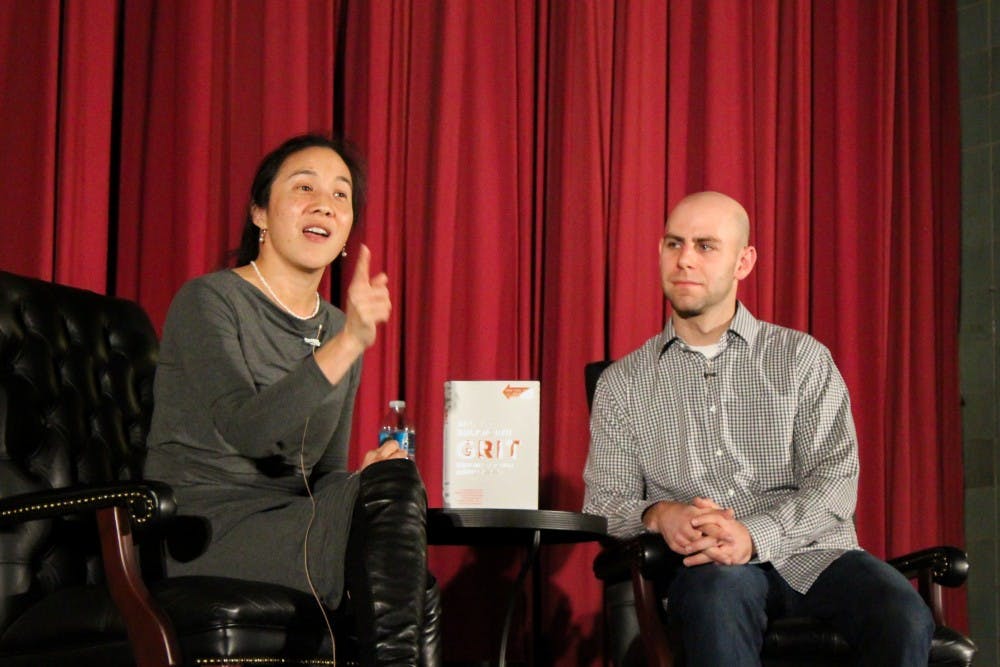
Penn professor Angela Duckworth talks about her newest book, “Grit,” and the ways in which working hard can lead to achieving goals.
Credit: Helen Fetaw , Helen FetawThinking about grit has become Angela Duckworth’s passion and full-time job.
The Penn professor, psychologist and 2013 MacArthur fellow spoke at the University of Pennsylvania Museum of Archaeology and Anthropology as part of the Authors@Wharton Series on Wednesday night about her new book, "Grit: The Power of Passion and Perseverance." Duckworth discussed her findings about what it means to have grit and how you can “reverse engineer” grit in her presentation, which was followed by a moderated discussion with fellow Penn professor Adam Grant.
Duckworth said that in studying the quality of grit, she aims to understand “the process of excellence.” Talent, according to Duckworth, is not synonymous with skill or an immediate recipe for success; rather, it requires immense effort.
“Talent counts, but effort, in my view, counts twice,” Duckworth said. Duckworth’s model for studying grit, explained in her book, says that talent combined with effort equals skill, and skill mixed with effort equals achievement. In this way, effort is factored in two times.
To be gritty, you must develop your interests, Duckworth said. Sometimes, your interests are not always apparent and it may take patience for you to see them, she added. Duckworth shared the anecdote that her daughter is always watching cooking videos, flipping through cookbooks and whipping up baked goods, but didn’t realize that she was actually interested in baking.
The professor also advised to, “align your interests with what you do all day,” as interest is a high predictor of job satisfaction.
Knowing the science of deliberate practice is another key element of obtaining grit, Duckworth said. Deliberate practice involves having a focus on what you want to work at, practicing alone, getting feedback and listening to the feedback in a non-defensive way.
The author used renowned psychologist Benjamin Bloom’s ideas that high-achievement develops in stages and must involve interest, practice and purpose, to back up her own arguments. It is particularly necessary to cultivate purpose in whatever you are trying to achieve, Duckworth said.
Duckworth remembered that when interviewing a successful wine taster about how he finds purpose in his job, he said, “I know I’m not curing cancer, but when I help someone appreciate their palate and see them holding the glass in their hand, it’s like a light bulb going off.”
Duckworth also incorporated the perspectives of some of her mentors and favorite high-achievers into her talk. She showed a video of her “tremendous crush” Will Smith talking about where his success comes from. In an interview, the actor said, “I am not afraid to die on a treadmill,” meaning that there will always be a person who is smarter, prettier or stronger, but if someone challenged him to run on a treadmill, he would not stop until the other person gave up or he died from exhaustion.
In the moderated discussion, Grant asked Duckworth if there can be such a thing as too much grit. Both professors acknowledged that sometimes perseverance can be wasted on an endeavor that is not worth the effort put into it. Duckworth said having an outside perspective on the thing you’re trying to work on might be a way to monitor when it is time to stop investing in a skill. She acknowledged that Grant actually might have given her this idea when they were talking a few years ago.
Grant also brought up that fact that "grit" has been critiqued as blaming people for their own problems and inability to succeed, without acknowledging the role that privilege and social conditions play in the attainment of success. Duckworth fully agreed with this criticism. She noted that at one time she had been asked to help make Baltimore public school kids “grittier,” so she observed their classes and felt that they were generally not being taught anything. Thus, “their circumstances weren’t allowing them to develop anything I study,” Duckworth said.
Duckworth applied her research to theory about parenting and to her own personal parenting style. The author said that leadership is like parenting. In the Duckworth household, they have the “hard thing rule” which means that each family member must have a hard thing that they are working on, and that they cannot quit halfway. Only you can pick what your hard thing will be, Duckworth said; it can’t be imposed on you by anyone else. Grant remarked that Duckworth truly lives by grit.
“In everything I do, I look for if there’s something it can teach me about grit,” Duckworth said.
The Daily Pennsylvanian is an independent, student-run newspaper. Please consider making a donation to support the coverage that shapes the University. Your generosity ensures a future of strong journalism at Penn.
Donate



